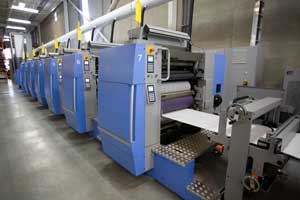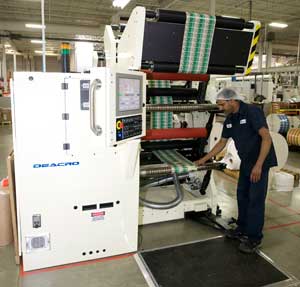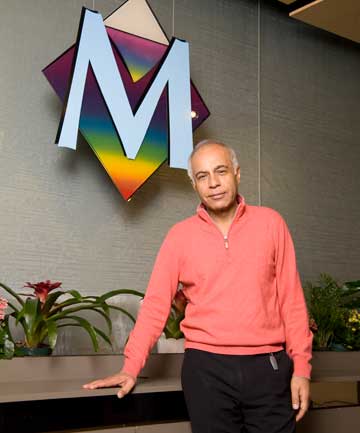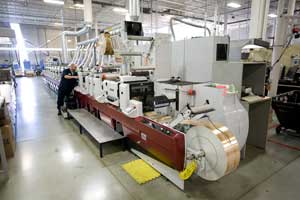
Metro Label makes lasting impressions
By Andrew Joseph, Features Editor
Automation Alpinta V press hybrid press Metro LabelNew hybrid press off to rave reviews and accolades at Metro Label
Trying to become a leader in the vast North American market for product labels can be a sticky business at times, but that’s just how the Toronto-based Metro Label Group Inc. likes it.
“When my father founded this company in 1974 he knew he wanted to build long-term relationships with his customers, employees and suppliers,” says Sandeep Lal, president of the Metro Label Group Inc.
“And while it hasn’t always been easy, we’ve stuck by our principles and supported our customers, and I think that’s why we’ve become one of the largest producers of pressure-sensitive labels in Canada.”
Over the years, Metro Label has grown quickly and smartly, establishing facilities in Napa Valley, Ca., Vancouver and Toronto to manufacture a broad range of pressure-sensitive, glue-applied, in-mold, continuous and shrinksleeve labels.
Boasting a veritable ‘Who’s Who’ of customers in the North American retail sector like Estée Lauder, Nestlé Waters North America, President’s Choice & Exact brands from Loblaw Companies and Life Brand of Shoppers Drug Mart, Metro Label also does very substantial work for the distilled spirits and wine companies throughout Canada, the U.S., Mexico, Central America and the Caribbean.
Employing about 130 people, the 132,000-square-foot LEED (Leadership in Energy and Environmental Design)-Certified (green building certification system) Toronto-facility fortifies Lal’s above-board way of doing business, while still keeping a sharp eye on the bottom line.
“When we built this plant in 2005, we wanted to create a safe environment for our employees which would also allow us to grow and create the highest-quality label products for our customer base,” Lal explains.
“But, we also wanted to ensure we looked after our community and the environment,” Lal told Canadian Packaging on a recent visit to the stylish facility in east-end Toronto.
Designed with an abundance of natural light openings, the building utilizes low-wattage lighting in the administration offices and manufacturing plant, which are automatically controlled by motion sensors that shut off when the area is empty.
In addition, the manufacturing facility uses a central heat recovery system that captures exhaust from all printing presses which it filters and reuses to heat the building.
Heat of the Moment
Moreover, all of the ceiling tiles and drywall are made from recycled fibers, Lal relates, while all the system furniture utilizes wood made from wheat stalk.
“When we constructed this plant, not only did we want to have an eco-friendly manufacturing facility, we wanted to ensure we would have room to grow our business,” explains Lal.
To grow that business, Lal decided early on not to pigeon-hole his company by doing only one type of printing process, aiming to be not just a jack-of-all-trades, but a master of them all.
Accordingly, the diversified label manufacturer uses a variety of processes to produce its wares: flexographic, gravure, waterless offset, conventional offset, digital offset, digital inkjet and even silkscreening.
States Lal: “There’s not a printing process out there that we don’t utilize.”
Most recently, the company made a significant capital investment with a 29-inch Alprinta V press manufactured by the Muller Martini Corporation, headquartered in Zofingen, Switzerland.
“We wanted to acquire a press that was built for performance, reliability and speed; a press which would have all of the automation to enable us to be efficient and cost effective for our clients,” mentions Lal.
Delivered to the Toronto facility in December of 2010, the Alprinta V was installed and tested extensively by the Concord, Ont.-based Muller Martini Canada staff.
Full Supply
Says Lal: “We wanted to deal with a supplier that had an excellent reputation, had local service and support and was financially strong, and the people at Muller Martini were excellent to work with,” notes Lal.
“And thanks to the training they provided to my staff, it has been very easy for us to utilize,” he adds. “Simply put, it’s a fantastic machine.”
Renowned for its operational flexibility, the Alprinta V hybrid press has nine print stations, including two for flexo, six for litho, and one that can be either flexo or litho, as required.
The Alprinta V continuosly format-variable web offset press was just what Metro Label needed, Lal says, providing the plant with an easy-to-use press that not only produces the high-quality labels expected by customers, but also facilitating notable time and cost savings that it is able to pass along to the customer.

The 29-inch Alprinta V combination press features two print stations for flexo, six for litho and one for both.
“We chose to work with the Alprinta V so we could accommodate large runs of pressure-sensitive labels and mid-sized to large-runs of flexible packaging and shrinksleeves,” explains Lal.
“Also, we like how the flexo stations on it allow us to lay down more opaque whites on clear films, and metallic colors, which look more brilliant when printed flexographically.
“The Alprinta V is also impressive in the ease with which we can make alterations to the printing size,” he notes. “The only thing that needs to be physically changed are the plate cylinder and the blanket cylinder, which is done without any tools and we don’t have to break the web.”
The changeable size parts are actually light in weight and are easy to handle, he adds, while matching the strength of its far heavier, old-fashioned counterparts.
According to Muller Martini, a few minutes is all it takes to change the press over to a new size.
Able to work with a wide range of printable substrates like paper, film, self-adhesive label stock and composite materials, the flexibility of the Alprinta V was a key factor in Metro Label’s purchase decision, according to Lal.
“But what really sold me was its ability to save us time, which is money,” Lal offers.
“In fact, we have already noticed an average of 25 per cent more uptime with this press, which means we can produce more labels faster without having to sacrifice quality.”

A Metro Label employee examinines a recently installed slitter-rewinder manufactured by Deacro Industries.
Lal says his Alprinta V press was purchased with a laminator unit as well as a rotary die-cutter.
The Butt-splicer and Turret rewinder supplied by Martini allows the press to run non-stop thanks to automated roll changeovers, allowing the press to run at close to its maxmum speed of 1,200 feet per minute.
With many existing customers already sold on the virtues of Muller Martini equipment, Lal already has many customers wanting to exploit the Alprinta V for themselves.
Despite Lal’s newfound appreciation for the Muller Martini press, he does not want to give the impression that he has other presses that are inferior.
“Quite the contrary, we ensure we have the best press for the best job,” he states.
Metro Label makes extensive use of narrow-web flexographic presses manufactured by Mark Andy, Inc. of St. Louis, MO., recently purchasing a pair of 13-inch Mark Andy XP5000 presses, one a 10-color and the other an 11-color press.
In addition, the company operates a number of presses from the Dutch equipment manufacturer MPS Systems B.V.
“The maximum number of flexo print stations we have on our presses is 12, and we can combine flexo and screen printing with hot-stamping and embossing in a single pass,” states Lal.
The waterless offset presses utilized by Metro Label are manufactured by Sanjo Corporation, a Japanese company that first developed and introduced UV (ultraviolet) waterless web offset technology to the label converting market.
“These presses can print up to 12 colors, but in combination with offset, screen, flexo, hot-stamping and embossing, it can print up to 14 colors in a single pass,” says Lal, adding that Metro Label also operates a gravure press made by Komori Chambon SAS, based in Orleans, France.
Other key label converting equipment at Metro Label in Toronto includes:
• Hewlett-Packard’s Indigo digital offset press, which applies the ink in a very thin smooth layer onto the substrate surface, rather than having it actually absorbed into the substrate, facilitating a very high quality output;
• Inspection machines for the slitters manufactured by the Mississauga-Ont.-based Scantech Automation Inc., which utilize the 100-percent defect detection systems from Advanced Vision Technology (AVT) Ltd.;
• Die-cutting line that cuts rolls into singles for Inmold and glue-applied labels from the German manufacturer, Schober GmbH;
• A slitter-rewinder from the Mississauga, Ont.-based Deacro Industries Ltd., a well-respected designer and manufacturer of quality high-performance slitting and rewinding machines;
• Inks for the Muller Martini Alprinta V are supplied by Sun Chemical Limited, while the Flint Group handles all other presses.
“For us, it’s all about earning our client’s trust day after day,” sums up Lal. “It’s a rock-solid foundation which our business was built on, and it’s one I am only too happy to continue with well into
the future.”
Advertisement



